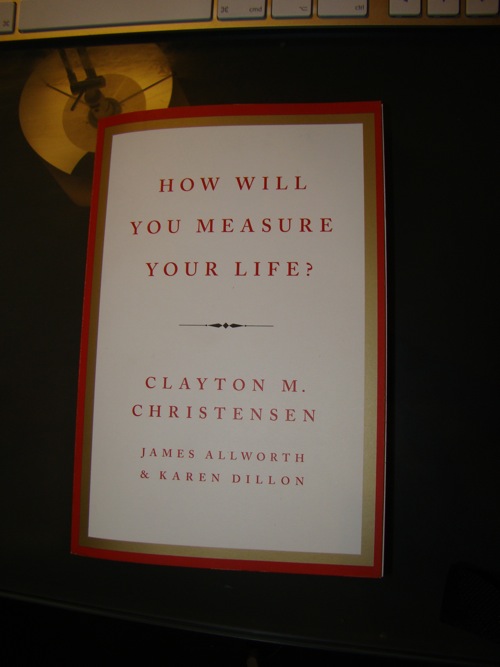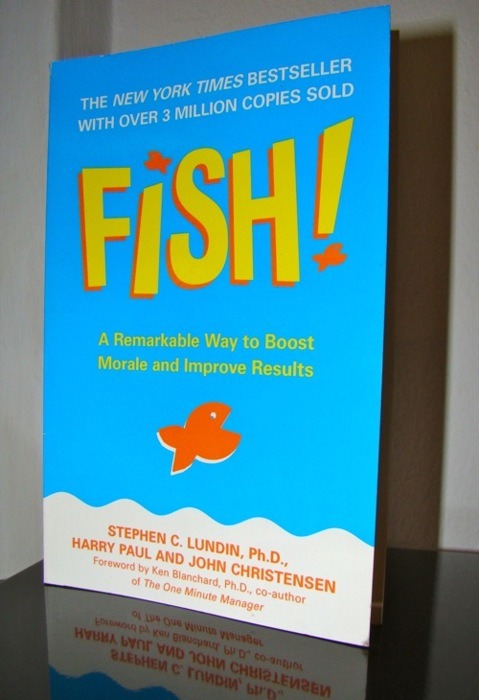
The only way to be truly satisfied is to do what you believe is great work. And the only way to do great work is to love what you do. If you haven’t found it yet, keep looking. Don’t settle. As with all matters of the heart, you’ll know you find it. — Steve Jobs
This will be another book commentary, because there are just so great things in this book, that I don’t have to reconstruct because it’s already written quite concise.
Too many of us who start down the path of compromise will never make it back. Considering the fact that you’ll likely spend more of your walking hours at your job than in any other part of your life, it’s a compromise that will always eat away at you.
I probably said it before, but if you want to do something, do it now, not in two years or ten years or after you married. You probably won’t do it in the future. If you want to start a company, do it now. If you want to work in a foreign country, do it now. If you want to work in a NPO, do it now.
By that’s not what I saw at the moment. Instead, I was impressed by the love Diana and her husband clearly shared with their two children. Seeing her there, I began to gain a perspective of Diana in the full context of her life. She wasn’t just a scientist. She was a mother and a wife, whose mood, whose happiness, and whose sense of self-worth had a huge impact on her family.
I studied economics and some portion of my fellow students pretty much had a view that people only react to money and that is everything there is at the job. Research have refuted this view since a long time but some people still don’t want to accept this. Interestingly, some organizations think everything can be solved with enough money; another fallacy.
Frederick Herzberg: This theory distinguishes between two different types of factors: hygiene factors and motivation factors. On one side of the equation, there are the elements of work that, if not done right, will cause us to be dissatisfied. These are called hygiene factors. Hygiene factors are things like status, compensation, job security, work conditions, company policies, and supervisory practices.
[…]
Compensation is a hygiene factor. You need to get it right. But all you can aspire to is that employees will not be mad at each other and the company because of compensation.
This is an important insight from Herzberg’s research: if you instantly improve the hygiene factors of your job, you’re not going to suddenly love it. At best, you just won’t hate it anymore.
[…]
Motivation factors include challenging work, recognition, responsibility, and personal growth. Feelings that you are making a meaningful contribution to work arise from intrinsic conditions of the work itself.
This connects to the last quote and Punished by Rewards by Alfie Kohn. The salary should be enough, so that people don’t have to think about it but it doesn’t help to motivate. Kohn quotes some studies that investigated whether commission helps to motivate sales persons to sell more and the studies concluded that it didn’t help at all and sometimes even had a adverse effect.
These motivational factors will become more important in the next years because Gen Y is entering the work force and they value these factors way more than the previous generation.
But after it [playhouse] was finished, I rarely saw the children in it. The truth was that having the house wasn’t what really motivated them. It was the building of it, and how they felt about their own contribution, that they found satisfying.
This is a fundamental insight. Firstly, this mindset doesn’t apply to everybody. I know some people who find results more important than the process. Secondly, at least I know a lot of hackers and crackers have this mindset. A proof of concept (PoC) is often enough to feel accomplished. You’ve shown that you can do it.
In startups, there’s often a similar mix of mindsets. The founders are often people, that look for a proof of concept. Getting the first profit, afterwards they aren’t so much interested in scaling the company. However, there are people who love to build on something and scale it up.
In conclusion, it depends on the job and the state which person you want to hire or which job you want to take.
There’s an old saying: find a job that you love and you’ll never work a day in your life. People who truly love what they do and who think their work is meaningful have a distinct advantage when they arrive at work every day. […]
Is this work meaningful to me?
Is this job going to give me a chance to develop?
Am I going to learn new things?
Will I have an opportunity for recognition and achievement?
Am I going to learn new things?
Will I have an opportunity for recognition and achievement?
Am I going to be given responsibility?
These are the things that will truly motivate you. Once you get this right, the more measurable aspects of your job will fade in importance.
These questions are a great summary of the findings in this chapter. Just work them through.
When the company’s leaders made a clear decision to pursue the new direction, the emergent strategy became the new deliberate strategy. […] Strategy almost always emerges from a combination of deliberate and unanticipated opportunities. What’s important is to get out there and try stuff until you learn where your talents, interests, and priorities begin to pay off. When you find out what really works for you, then it’s time to flip from an emergent strategy to a deliberate one.
This last few sentences are important. Really, just try stuff. Try it, if it works and you have fun, great. If it doesn’t, just do something else. This applies for a career, a company or your life in general.
Discovery-driven planning by Ian MacMillian and Ria McGrath: Ask yourself what assumptions have to prove true for you to be happy in the choice you are contemplating. Are you basing your position on extrinsic or intrinsic motivators? Why do you think this is going to be something you enjoy doing? What evidence do you have?
Pretty much same approach was used in Running Lean. Create hypotheses and test them. If you can reject them, then you know at least that the current project/job isn’t the right one.
You can talk all you want about having a strategy for your life, understanding motivation, and balancing aspirations with unanticipated opportunities. But ultimately, this means nothing if you do not align those with where you actually expend your time, money and energy.
Just do it.
Often even more perplexing, however, is when these problems arise within the mind of the same person: when the right decision for the long term makes no sense for the short term; when the wrong customer to call on is actually the right customer to call on; and when the most important product to sell makes little sense to sell at all. […]
In baseball terms, however, instead of exciting new “home run” products, its innovators often produce instead bunts and singles — year after year. Why? After studying their efforts for over a decade, I concluded that the reason is that Unilever (and many corporations like them) inadvertently teach their best employees to hit only bunts and singles. […]
The system rewards tomorrow’s senior executives for being decidedly focused on on the short term — inadvertently undermining the company’s goals. Misaligned incentives are pervasive. […]
They prioritized things that gave them immediate returns — such as a promotion, a raise, or a bonus — rather than the things that require long-term work, the things that you won’t see a return on for decades, like raising good children.
This is actually a field economics helps a lot, understanding incentives. Every structure generates incentives, often a lot of unintended ones. In this company it was probably an unintended incentive and a resulting consequence. But this happens more often that you may think.
Professor Amar Bhide showed in his Origin and Evolution of New Business that 93 percent of all companies that ultimately become successful had to abandon their original strategy — because the original plan proved not to be viable.
The latest (?) hype term was pivoting, that is exactly was Amar Bhide described. Mind you, that book was written in 2000. However, probably somebody saw this even earlier.
The theory of good money and bad money essentially frames Bhide’s work as a simple assertion. When the winning strategy is not yet clear in the initial stages of a new business, good money from investors needs to be patient for growth but impatient for profit. It demands that a new company figures out a viable strategy as fast as and with as little investment as possible — so that the entrepreneurs don’t spend a lot of money in pursuit of the wrong strategy.
Financial restriction can be a lot more healthy for a company if it has to generate profits. A friend of mine and I talked about it and I think that you could probably get more innovation if decrease rather than increase the budget for “R&D”. You can probably increase the effect if you create an extra company just for a new product idea.
There’s significant research emerging that demonstrates just how important the earliest months of life are to the development of intellectual capacity. […] Todd Risley and Betty Hart, studied the effects of how parents talk to a child during the first two and a half years of life. After meticulously observing and recording all of the interactions between parent and child, they noticed that on average, parents speak 1,500 words per hour to their infant children. “Talkative” parents spoke 2,100 words to their child, on average. By contrast, parents from less verbal backgrounds spoke only 600 per hour, on average.
[..]
And it didn’t matter that just any words were spoken to a child — the way a parent spoke to a child had significant effect. The researchers observed two different types of conversations between parents and infants. One type they dubbed “business language” — such as, “Time for a nap”, “Let’s go for a ride”, and “Finish your milk.” Such conversations were simple and direct, not rich and complex.
[…]
In contrast, when parents engaged in face-to-face conversation with the child — speaking in fully adult, sophisticated language as if the child could be part of a chatty, grown-up conversation — the impact on cognitive development was enormous. These richer interactions they called “language dancing”. Language dancing is being chatty, thinking aloud, and commenting on what the child is doing and what the parent is doing or planning to do. “Do you want to wear the blue shirt or the red shirt today?” “Do you think it will rain today?” “Do you remember the time I put your bottle in the oven by mistake?” and so on.
Language dancing involves talking to the child about “what if” and “do you remember” and “wouldn’t it be nice if” – questions that invite the child to think deeply about what is happening around him.
Great to know. I will probably read some books about this topic in the future. This is just an appetizer.
[..] my colleagues and I have developed a theory about this approach to marketing and product development, which we call “the job to be done.” The insight behind this way of thinking is that what causes us to buy a product or service is that we actually hire products to do jobs for us. […]
IKEA doesn’t focus on selling a particular type of furniture to any particular demographically defined group of consumers. Rather, it focuses on a job that many consumers confront quite often as they establish themselves and their families in new surroundings: I’ve got to get this place furnished tomorrow, because the next day I have to show up at work.
You’ve probably heard about this theory before and I find it pretty good. As a company, it is important why people use your products/service. This works on a deeper level. Why do people use your website, which job are they going to get done? And it hasn’t just to be one job, it could depend on time, location or other factors.
The chief executive of BIG, Mike Collins, didn’t think the game would sell. But instead of sending the inventor packing, he asked him, “What caused you to develop this game?” […]
If someone develops a product that is interesting, but which doesn’t intuitively map in customers’ mind on a job that they are trying to do, that product will struggle to succeed — unless the product is adapted and repositioned on an important job.
A bit more on new product development / startups. It’s a very economic question: “How does this product decrease effort / cost or increase profit?” – however, thanks to loss aversion decrease of costs its about two times higher valued that increase in profit at a personal level. In the B2B market, it’s probably more 1:1.
The two fundamental jobs that children need to do are to feel successful and to have friends — every day.
This is their explanation why school does such a poor job. Do kids feel successful if they get bad grades? No. Do kids have friends, if they are the nerds/dorks? Probably no.
The first of the factors that determine what a child can and cannot do is his resources.
The second group of factors that determine a child’s capabilities are processes. Processes are what your child does with the resources he has, to accomplish and create new things for himself.
The final capability is the child’s personal priorities.
This is the three factor model applied on a person instead of a company. They attribute that the last two are the most important.
Parents seem to be carting their children around to an endless array of activities in which the kids are not truly engaged, it should start to raise red flags. Are the children developing from these experiences the deep, important processes such as teamwork, entrepreneurship, and learning the value of preparation? Or are they just going along for the ride?
Self-esteem — the sane that “I’m not afraid to confront this problem and I think I can solve it” — doesn’t come from abundant resources. Rather, self-esteem comes from achieving something important when it’s hard to do.
Interesting enough, Nathaniel Branden which is quite famous for his work on self-esteem, emphasized that self-esteem can only come from within and goes along with accomplishment. However, like so many great theories, it got dumbed-down to “give medals to everybody!”.
Children learn when they are reading to learn.
The idea that some people have innate talents that just need to be identified has proved to be an unreliable predictor of success in business. […]
A challenging job, a failure in leading a project, an assignment in a new area of the company — all those things become “courses” in the school of experience. […]
Or, in other words, he had the right processes to do the job. In expressing a preference for t he more polished candidate, we biased ourselves toward resources over the processes. It is what I described in the previous chapter as something parents do, and it’s an easy mistake to make.
The underlying theory is, that solving the right problems helps you solving the same problems later, not general aptitude. Rework communicated that before. Don’t hire a quantum mechanics PhD for web design, hire somebody who designed websites before. They will have more fun, more challenging work and be happier than the quantum mechanics PhD in the same job.
He’ll think, my parents will be there to solve hard problems for me. I won’t have to figure it out on my own. Good grades are what matters, much more than doing the work.
I agree with such a lot in this book, it’s terrifying. I heard about some teachers, that expect that parents will help kids on their assignments. It’s crazy. Where’s the accomplishment, if you haven’t accomplished anything?
Like in the example with our hiring mangers at the start of this chapter, it’s tempting to judge success by a resume — by looking at the scoreboard of what our children have achieved. But much more important in the long run is what courses our kids have taken as they’ve gone through the various schools of experience. More than any award or trophy, this is the best way to equip them for success as they venture out into the world.
As the emperors watched the chariot go over the hill — knowing full well they would not see their associate again for years — they needed to know that their understudy’s priorities were consistent with their own, and that he would use proven, accepted methods to solve problems. Culture was the only way to make sure this happened. […]
In the case of a company, it’s common to describe culture as the visible elements of a working environment […]. But as MIT’s Edgar Schein explains, those things don’t define a culture. They’re just artifacts of it.
Definition:
Culture is a way of working together toward common goals that have been followed so frequently and so successfully that people don’t even think about trying to do things another way. If y culture has formed, people will autonomously do what they need to do the be successful. — Edgar Schein
I really like this definition because it’s neutral. A culture could be pretty bad because people stop improving or criticizing the status-quo. But, nonetheless it’s a culture.
What’s also important is that: A culture happens, whether you want it to or not. Tony Hsieh written a ton about creating and sustaining a culture in Delivering Happiness. I would recommend that to you, if you want a non-academic introduction into this field.
It starts with defining a problem — one that recurs again and again. Next, they must ask a group to figure out how to solve that problem. IF they fail, ask them to find a better way to solve it. Once they’ve succeeded, however, the managers need to ask the same team to solve the problem every time it recurs — over and over again. The more often they solve the problem successfully, the more instinctive it becomes to do in the way that they designed. Culture in any organization is formed through repetition.
This is an other important point about culture. It’s created through repetition. Better, repetition and consistency.
Famous examples abound — Enron had a “Vision and Values” statement. IT aimed to conduct itself in line with four Values: Respect, Integrity, Communcation, and Excellence.
There’s a nice game I played with a friend a while. Go to a random company site, look for the mission/values statement. Check how many of these points are really implemented.
More often than not, only a few points are really into their culture. Mostly, they just write what they think would be great but it’s not true and of no value.
I personally don’t care about what people/companies promise. Show me what you do, that’s what I want to see.
Everybody agreed this was a promising plan [steel mills like Nucor had to undercut their price] … everybody expect the chief financial officer. When he saw that the plan involved spending money to build new mills, he put the brakes on. “Why should we build a new mill? We have 30 percent excess capacity in our existing mills. IF you want to sell a extra ton of steel, make it our existing mills. The marginal cost of producing an additional ton in our existing mills is so low that the marginal profit is four times greater than if we build a completely new mini-mill.”
The CFO made the marginal-thinking mistake. He didn’t see that by utilizing the existing plant, they were not changing their fundamental cost o making steel at all. Building a completely new mill would have had an up-front cost, but then given the company a new and important capability for the future. […]
Why is it that the big, established companies that have so much capital find these initiatives to be so costly? And why do the small entrants with much less capital find them to be straightforward?
The answer is in the theory of marginal versus full costs.
This is a rather common scenario. Sometimes but it’s clear where this comes from. Try to avoid such situations and try to think in a bigger picture.
The last part talks about purpose which consists of likeness, commitment and metrics. That is:
What do you want to be like?
How do you become committed?
How do you measure your success?
You can ask yourself, which purpose you are currently following.
All in all, I really liked this book. It’s well written, the idea of applying business frameworks on one’s own life is great and the observations are head-on. Recommendation!




